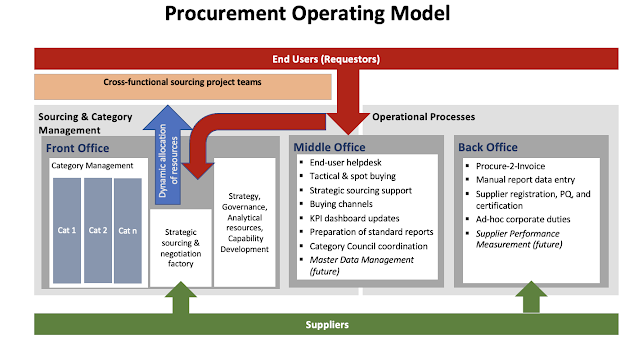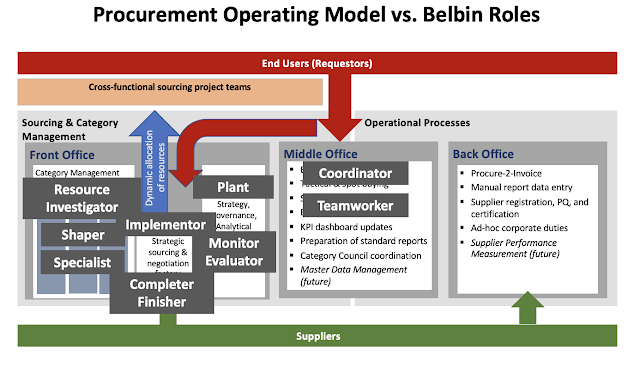Maximizing Procurement Team Performance with the Belbin Team Role Theory
Building a High-Performing Procurement Team
While efficient sourcing, negotiation, and supplier management are crucial for organizational success, the strength of the procurement team is equally important.
Building a high-performing procurement team requires a deep understanding of team dynamics and the role mix to create a balanced professional and emotional skillset.
This is where the Belbin Team Role Theory comes into play. Developed by Dr. Meredith Belbin, this theory provides valuable insights into team dynamics and can significantly enhance the effectiveness of procurement teams.
This blog post will explore how the Belbin Team Role Theory can be applied in procurement.
Nine Belbin Team Roles in Procurement
The Belbin Team Role Theory identifies nine distinct roles that individuals naturally gravitate towards within a team. Let's explore these roles and their relevance in procurement:- Plant: The Plant role is characterized by creativity, originality, and the ability to generate unique ideas and solutions. Plants are often the innovators within a team, offering fresh perspectives and unconventional approaches to problem-solving.
- Resource Investigator: Resource Investigators are excellent networkers and communicators. They possess strong interpersonal skills and enjoy building relationships with external parties. They are adept at gathering information, exploring new opportunities, and establishing connections.
- Coordinator: Coordinators are natural team leaders who organize and delegate tasks. They are skilled at bringing people together, ensuring effective collaboration, and maintaining harmony within the team.
- Monitor Evaluator: This role involves critical thinking, objectivity, and a strong analytical mindset. Individuals in this role are skilled at assessing information, evaluating options, and making informed decisions.
- Implementer: Implementers are known for their practicality, efficiency, and attention to detail. They excel at turning ideas and plans into tangible actions.
- Completer Finisher: Individuals with the Completer Finisher role are meticulous, detail-oriented, and focused on delivering high-quality outcomes. They have a keen eye for identifying errors, ensuring compliance with regulations and standards, and meeting deadlines.
- Teamworker: A catalyst for collaboration and unity within groups, the team worker excels in helping colleagues to overcome differences and avoid conflict while striving towards a common goal. Their mission to create a supportive work environment means team workers are often famous figures.
- Specialist: Specialists possess specialized knowledge, skills, and expertise in a specific area. They are highly proficient in a particular domain and are often the go-to person for specific technical or subject matter expertise.
- Shaper: Shapers are dynamic, assertive, and action-oriented individuals. They thrive in challenging situations, enjoy taking risks, and are naturally driven to achieve results. Shapers are often instrumental in driving progress, pushing for innovation, and challenging the status quo.
Procurement Operating Model with Front, Middle, and Back Office.
The question now can be where to place all their roles in the procurement organization.
We suggest using Accenture's well-known procurement operating model, which employs front, middle, and back offices. You can find the classical view of that model here, while we suggest its slightly modified version.
Here, we assume that the interaction with end-users will happen via the Procurement Service Desk in the Middle Office, the sourcing function will reside in the Front Office alongside the Category Management, and the Front Office will also include the Strategy, Analytics, and Functional Development capabilities.
We believe that Belbin roles can be mapped perfectly to this operating model:
- Plant will lead the Strategy to ensure long-term functional development.
- Resource investigator will fit the Category Management to establish connections with new partners and seek new opportunities to manage the category.
- Coordinator will manage the incoming flow of end-user requests in the Middle Office.
- Monitor Evaluator will develop analytical and reporting capabilities in the Strategy team.
- Implementers will conduct sourcing to demonstrate their famous attention to detail in executing the Category Strategy.
- Completer Finishers will also work with the sourcing team to safeguard process integrity and ensure the best possible savings and efficiencies.
- Teamworkers will naturally belong to the Middle Office, where they will gel the team, cover resource gaps, and create positive working relations within the team and with end-users.
- Specialists will support category managers with their subject-matter expertise to impartially analyze demand drivers and technical requirements.
- Shapers will challenge the status quo by finding unconventional solutions for category strategies.
With all respect to Back Office colleagues, this team will grow new talents. Still, it won't have critical roles as there's a high chance of outsourcing or gradually automating this cluster of activities.
P.S. If you appreciate hundreds of hours invested in researching and writing this blog, you can buy me a coffee or subscribe for the membership by following this link. Thank you!
To keep receiving new insights and research, please subscribe here.
More information on this and other exciting topics can be found in "The Technology Procurement Handbook." It represents 23 years of experience, billions of dollars worth of successful sourcing projects, and 1000s hours spent on research, analysis, and content creation for the most demanding professional readers.







Comments
Post a Comment